
St John Chrysostom: Lazarus and the Rich Man: When Are the Poor Unworthy? On Wealth and Poverty
St John Chrysostom entreats us: “The poor man has one plea:” “Do not require anything else from him; but even if he is the most wicked of all men and is at a loss for his necessary sustenance, let us free him from hunger.”
“Christ also commands us to do this, when He said, ‘Be like your Father in heaven, for He makes His sun rise on both the evil and the good, and sends rain on the just and on the unjust.’ The alms giver is a harbor those in necessity:” “whether they are bad or good or whatever they are who are in danger.”
A virtuous almsgiver is not a judge. “Charity is charity when we give it even to the unworthy.” “Need alone is the poor man’s worthiness.” “For if we investigate the worthiness of our fellow servants, God will do the same for us.” […]


